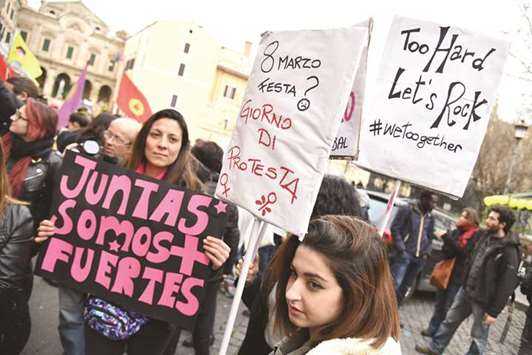Countries around the world mobilised yesterday for International Women’s Day with Spaniards on an unprecedented strike, France threatening to “name and shame” firms that pay women less, and Iraqi women running a shortened “marathon”.
The #MeToo and #Timesup campaigns that went global with allegations of sexual misconduct in Hollywood galvanised this year’s celebrations amid surging demand from women for respect and equality.
Hundreds of trains were cancelled in Spain over the work stoppage and countless protests in defence of women’s rights held across the country.
Ten unions demanded gender equality as the 24-hour strike sought to emulate Iceland’s 1975 work stoppage, when women took a day off to demonstrate their vital contribution to the economy and society.
Female television and radio presenters went off air, and Spain’s state TVE channel ran repeat programmes to compensate.
Spain’s two main unions, however, refused to join the 24-hour strike and called on their members to stop work for just two hours.
Some 5.3mn people took part, they said.
In Paris, President Emmanuel Macron pledged to “name and shame” companies that pay women less than men for the same work.
French Prime Minister Edouard Philippe had already warned on Wednesday that such companies could be fined up to 1% of their wage bill.
French daily Liberation found a novel way to get a man’s attention, by hiking the paper’s cost by 25% for all males.
French women earn on average 25.7% less than men, according to a 2017 watchdog report.
German Chancellor Angela Merkel put out a video saying women should not rest on their laurels.
“The fight for equal rights continues,” she said.
Much remained to be done “so that women have the same rights as well as the same duties as men ... we will get there”.
In Pristina, three red billboards like those in the Oscar-winning movie Three Billboards Outside Ebbing, Missouri, were placed outside the Kosovo police headquarters.
“How many more missed calls?” read the first, followed by the names of two women – Diana Kastrati and Zejnepe Bytyqi – who were killed by their husbands.
Kosovo’s Haveit Group created the banners to criticise the police system, which failed to respond in time to save the victims.
With #internationalwomensday2018, trending worldwide, a new report called An End to Manels, or all-male panels, found female speakers are outnumbered by men by three to one at Europe’s top international meetings.
The survey of world leaders and businesspeople addressing top conferences over the last five years shows a “huge gender gap” with 74% of speakers male, the Open Society Foundations group said.
Gloomier still, the UN labour agency warned that gradual progress toward parity between the sexes in the workplace was expected to soon grind to a halt and could even reverse.
“On average around the world, women remain much less likely to participate in the labour market than men,” the International Labour Organisation (ILO) said.
Today, 48.5% of women and girls over the age of 15 are part of the global workforce – 26.5 percentage points below the rate of male participation, the report found.
Thus, for every 10 men in a job globally, only six women are employed, it said.
“The situation ... is really stagnated, and it provides a grim prognosis,” said Shauna Olney, who heads ILO’s gender, equality and diversity division.
“Something needs to change, and it needs to change dramatically,” she said in Geneva.
At the Geneva Motor Show “booth babes” have almost disappeared this year in a notable change as manufacturers try to clean up their image.
The recent trend seems to have gained significant steam in a world reeling from revelations of sexual abuse, harassment and discrimination across all industries.

Women take part in a march in Rome, organised by ‘Non Una Di Meno’ (Me too) movement as part of the International Women’s Day. ‘Non Una Di Meno’, which translates as Not One (Woman) Less, is the equivalent of the movement that grew out of the Harvey Weinstein-spurred sexual harassment and rape revelations.
